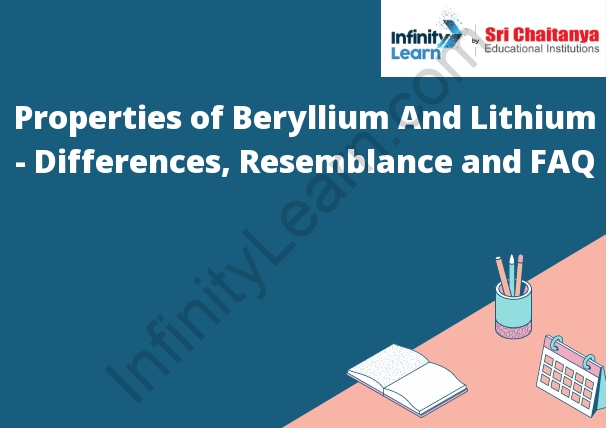Table of Contents
Properties of Beryllium and Lithium
Beryllium is a soft, light metal that is silver in color. It is the lightest of the alkaline earth metals. Beryllium is very strong for its weight and has a very high melting point. It is not reactive with other elements, but it does form a strong, corrosion-resistant alloy with copper.
Lithium is a soft, light metal that is silver in color. It is the lightest of the alkali metals. Lithium is very strong for its weight and has a very high melting point. It is not reactive with other elements, but it does form a strong, corrosion-resistant alloy with copper.

Lithium and Other Alkali Metals
The alkali metals are a group of elements in the periodic table that includes lithium, sodium, potassium, rubidium, cesium, and francium. These elements are all highly reactive and have one or two electrons in their outermost energy levels that are ready to be lost, making them very good at forming ions. The alkali metals are all soft, silver-white metals that are very soluble in water. They are also very reactive with air, so they are usually stored in oil or other inert substances.
Lithium is the lightest of the alkali metals and has the lowest ionization energy. It is used in batteries and as a psychiatric medication. Sodium is the most common alkali metal and is used in table salt. Potassium is a nutrient and is used in fertilizers. Rubidium is used in atomic clocks. Cesium is used in radiation therapy. Francium is the most unstable of the alkali metals and has only been found in trace amounts in nature.
Differences between Beryllium and Other Alkaline Earth Metals
Beryllium is unique among the alkaline earth metals because it is the only one that is a solid at room temperature. The other alkaline earth metals are all liquids at room temperature. Beryllium also has a lower density than the other alkaline earth metals. This means that a given volume of beryllium weighs less than the same volume of any of the other alkaline earth metals.
Why does Lithium Exhibit Different Properties from Other Group Elements?
The reason that lithium exhibits different properties from other group 1 elements is that it has a smaller size and a higher charge density. This means that it can interact more strongly with other atoms and molecules. Additionally, lithium is less reactive than the other group 1 elements, because it has a lower ionization energy.
What are the Major Differences between Lithium and Other Alkali Metals?
The major difference between lithium and other alkali metals is that lithium is the lightest of all the alkali metals. It also has the lowest ionization energy, meaning that it takes the least amount of energy to remove an electron from a lithium atom. Lithium also has the highest melting point and the lowest vapor pressure of all the alkali metals.
Why does Lithium show a Diagonal Relationship with Magnesium?
The diagonal relationship between lithium and magnesium is due to the similarity in their chemical properties. Both elements are alkaline earth metals, meaning they are both reactive and have a low melting point.
Why does Beryllium show Anomalous Behaviour From the Other Group Elements?
Beryllium is anomalous because it has a smaller atomic radius than the other group elements. Additionally, it is the most electropositive element in the group.
Why Beryllium shows Resemblance with Aluminium?
Beryllium is a light metal that has a close atomic number to aluminium. This means that it has a similar number of protons in its nucleus. It is also very similar in terms of its physical properties, such as its density and melting point.








